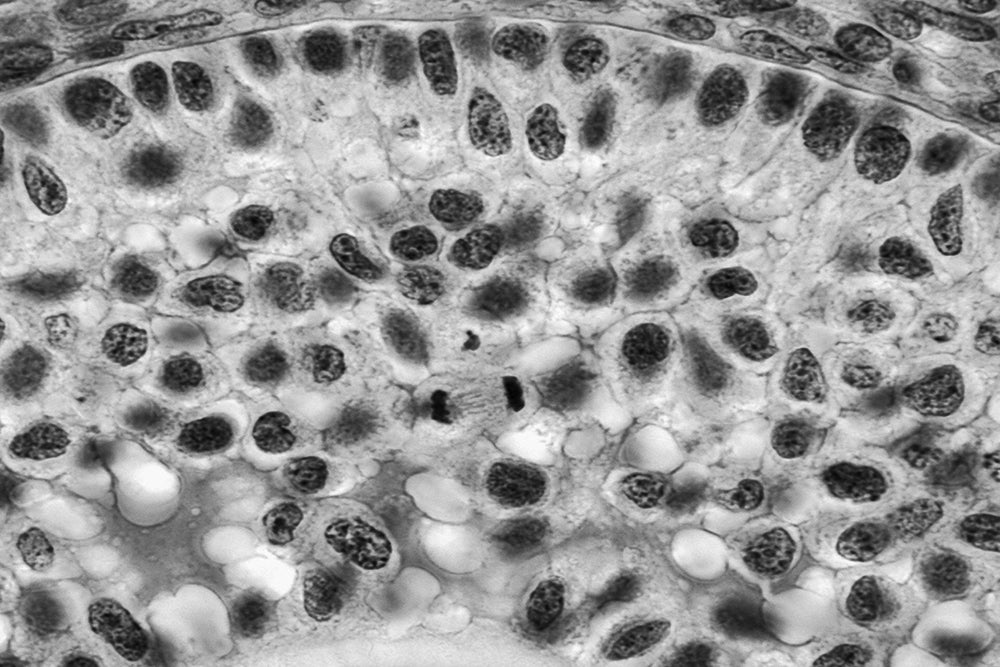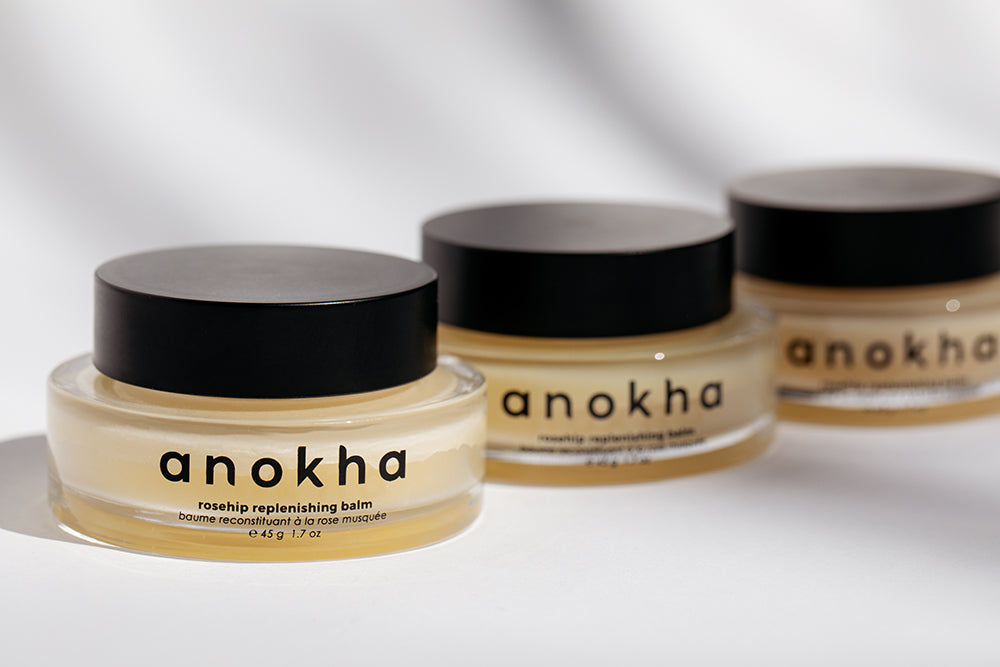
ingredient focus: rosehip

the bottom line
The Andean Indians of Chile have long relied on the power of rosehip seed oil as part of their medicinal, skin, and hair regimens. In recent years, rosehip has also made its way into skincare products from global brands. But despite its widespread use and anecdotal reports of efficacy for scar reduction, there’s a lack of broad clinical evidence to explain its claims. Here, we dive into the history and science of rosehip to explore the mystery of this powerful plant.
first layer: the history
The source of rosehip seed oil, the dog rose, is a shrub characterized by its unique botanical feature of multiple fruits referred to as “hips”. The dog rose is native to Europe but is now widely distributed across South America. Chile is currently the most important producer of rosehip seed oil.
Rosa mosqueta or moschata, the INCI name commonly used for rosehip seed oil, actually encompasses oils from Rosa rubiginosa, Rosa eglanteria, and Rosa mosqueta, but not the more common Rosa canina. While rosehip oil is derived from the fruit and seeds of the shrub, rosehip seed oil is harvested from the seeds of the rose hip alone. Pure cold-pressed rosehip seed oil has an unmistakable and vibrant reddish-orange color with a sweet aroma. Recall that the colors of oils can give us a clue as to their benefits, with red and orange oils showing a tendency to be particularly useful in regeneration of the skin, including wound healing, scar treatment, improving skin texture and tone, and enhancing skin elasticity.
second layer: the science
Rosehip seed oil possesses valuable phytochemicals, including phenolic compounds*, carotenoids*, polyunsaturated fatty acids*, and phytosterols*. Rosehip seed oil is unique in the presence of trans-retinoic acid or treretinoin, a vitamin A derivative.
The polyunsaturated fatty acids present in rosehip seed oil include 17% linolenic acid (omega-3), 54% linoleic acid (omega-6), and 16% oleic acid (omega-9). Omega-3 and omega-6 fatty acids are particularly helpful in improving skin barrier function. High levels of omega-6 fatty acids have also been shown to be helpful for those with acneic skin, as studies have found that linoleic acid deficiency is linked to development of acne.
Carotenoids are yellow, orange, and red organic pigments produced by plants, algae, bacteria, and fungi. They are responsible for the color found in pumpkins, carrots, flamingos, and salmon. Rosehip seed oil is particularly high in beta-carotene, a precursor to vitamin A which can help to decrease the appearance of fine lines and wrinkles.
Phenolic compounds contain antioxidants, compounds that inhibit oxidation. Free radicals create oxidative stress and an inflammatory response which in turn can damage DNA and result in injury to the epidermal and dermal layers of the skin. In the skin, this manifests as premature aging with decreased elasticity leading to increased wrinkling, age spots, and decreased skin tone. Antioxidants stabilize free radicals, which in turn limits their ability to damage the body.
Finally, phytosterols are thought to be helpful in blocking reduced collagen synthesis following ultraviolet radiation and protecting the skin barrier.
third layer: skin care
Rosehip seed oil is considered to be an excellent choice for the care of irritated, mature and acne-prone skin, as well as for skin with open wounds and scars.
moisturizer: With high levels of omega-3 and omega-6 fatty acids, rosehip seed oil is an effective moisturizer which can also help with repair of the skin barrier.
anti-inflammatory: The antioxidants present within rosehip seed oil provide an anti-inflammatory effect which may assist in reducing irritation secondary to dermatitis, eczema, and rosacea.
scars: One study evaluated the use of rosehip oil for scars. The authors used pure rosehip seed oil on the fresh post-surgical excision sites of 76 patients and compared them to an untreated control group. When evaluating for typical findings of scars including redness, discoloration, atrophy, and hypertrophy, they found that treated patients showed statistically less redness at 6 and 12 weeks, and less discoloration and atrophy at 12 weeks. There were no differences in the level of scar hypertrophy between the groups. This suggests utility in the use of rosehip seed oil for the treatment of scars when used early in the healing process.
wound healing: A study on the treatment of skin ulcers and post-surgical wounds showed improved healing when treated with a 26% concentration of Rosa mosqueta oil as compared to a control group not treated with the oil. However, another study examined fingerstick lesions in diabetics and found no difference in the prevention or treatment of these lesions when rosehip seed oil was used. A third study evaluated the effectiveness of rosehip seed oil in the prevention of epithelitis (inflammation of the mucosal epithelium) in patients with head and neck cancer treated with radiation therapy. The authors studied 28 patients who applied rosehip seed oil twice daily to regions of irradiated skin. They were compared to a control group of 34 patients who had received other treatments and who had different levels of skin injury. Given the lack of a true control group, it is perhaps not surprising that no significant differences were seen, but the use of rosehip seed oil was not associated with any adverse effects.
skin regeneration: Regenerative properties of rosehip seed oil have been attributed to the presence of trans-retinoic acid within the oil. Although the presence of treretinoin within the oil is believed to assist in the reduction of fine wrinkles, the actual concentration of this active may be too low to achieve the same effects as that of pure trans-retinoin. The high level of beta-carotene may also be responsible for the reported effects of decreased fine wrinkles and improved elasticity, but there are no clinical studies to our knowledge to support this claim for the topical use of rosehip seed oil.
acne: High levels of omega-6 fatty acids have been shown to be helpful for those with acneic skin, as studies have found that linoleic acid deficiency is linked to development of acne.
fourth layer: how we do it
Rosehip seed oil is one of the key ingredients in two of our products: bakuchiol & pomegranate facial oil, and rosehip replenishing balm (dropping february 2023). Our bakuchiol & pomegranate facial oil is a luxurious treatment formulated for mature skin which combines retinol alternative bakuchiol with rosehip seed oil, sea buckthorn oil, pomegranate, coenzyme Q10, and bisabolol to help reduce the appearance of fine lines, hyperpigmentation, and acne; assist in evening skin tone; and soothe dry and irritated skin. Our rosehip replenishing balm was created especially for Dr. Naidu’s surgical patients who require a gentle but effective treatment to assist in soothing post-surgical skin and reduce scarring. Containing rosehip seed oil, sea buckthorn oil, gotu kola extract, argan oil, arnica, and mango butter, it’s a powerhouse of regenerative beauty.
All this and more at www.anokhaskincare.com
xx
anokha
references:
- Moreno Gimenez JC, Bueno J, Navas J, Camacho F. Treatment of skin ulcer using oil of mosqueta rose. Med Cutan Ibero Lat Am 1990; 18(1): 63-66.
- Aguirre-Romero AB, Galeano-Valle F, Conde-Montero E, Velazquez-Tarjuelo D, de la Cueva-Dobao P. Efficacy and safety of a rosehip seed oil extract in the prevention and treatment of skin lesions in the hands of patients with type 1 diabetes mellitus caused by finger prick blood glucose monitoring; a randomized, open-label, controlled clinical trial. Endocrinol Diabetes Nutr (Engl Ed). 2020; 67(3):186-193.
- Rodriguez MB, Iriarte MA. Evaluation of the effectiveness of an oil extract of rosehip in the prevention of epithelitis due to radiotherapy in patients with head and neck cancer. Rev Enferm 2016; 39(1):49-52.
- Janes D, Kocevar Glavac N. “Dog rose”, in Modern Cosmetics. 2018. Velenje, Slovenia: Sirimo dobro besedo, d.o.o., pp. 94-96.
- Valeron-Almazan P, Gomez-Duaso AJ, Santana-Molina N, Garcia-Bello MA, Carretero G. Evolution of post-surgical scars treated with pure rosehip seed oil. J Cosmet Derm Sci App 2015; 5: 161-167.
- Marchini FB, Martins DM, de Teves DC, Simões Mde J. Efeito do óleo de rosa mosqueta na cicatrização de feridas abertas [Effect of Rosa rubiginosa oil on the healing of open wounds]. Rev Paul Med. 1988 Nov-Dec;106(6):356. Portuguese.
- Ilyasoğlu H. Characterization of Rosehip (Rosa canina L.) Seed and Seed Oil, International Journal of Food Properties 2014; 17(7): 1591-1598.
- Grether-Beck S, Mühlberg K, Brenden H, Krutmann J. Topische Applikation von Vitaminen, Phytosterolen und Ceramiden. Schutz vor vermehrter Expression der interstitiellen Kollagenase und verminderter Kollagen-I-Expression nach 1-maliger UVA-Bestrahlung [Topical application of vitamins, phytosterols and ceramides. Protection against increased expression of interstital collagenase and reduced collagen-I expression after single exposure to UVA irradiation]. Hautarzt 2008; 59(7): 557-62. German.
definitions:
antioxidants: compounds that inhibit oxidation. free radicals create oxidative stress and an inflammatory response which in turn can damage DNA and result in injury to the epidermal and dermal layers of the skin. in the skin, this manifests as premature aging with decreased elasticity leading to increased wrinkling, age spots, and decreased skin tone. antioxidants stabilize free radicals, which in turn limits their ability to damage the body.
carotenoids: carotenoids are yellow, orange, and red organic pigments produced by plants, algae, bacteria, and fungi. they are responsible for the color found in pumpkins, carrots, flamingos, and salmon.
phenolic compounds: phenolic compounds contain antioxidants, compounds that inhibit oxidation.
phytosterols: plant-derived compounds that are structurally related to cholesterol.
for more beauty definitions, explore the glossary.
faq's:
what are some rosehip oil benefits?
rosehip seed oil is considered to be an excellent choice for the care of irritated, mature and acne-prone skin, as well as for skin with open wounds and scars.
what is the best rosehip oil?
the best rosehip seed oil is believed to come from Chile.
does rosehip oil clog pores?
rosehip oil is not known to clog pores. it has a low comedogenic rating of 1.
is rosehip oil good for acne?
high levels of omega-6 fatty acids such as those found within rosehip seed oil have been shown to be helpful for those with acneic skin, as studies have found that linoleic acid deficiency is linked to development of acne.
is rosehip oil safe during pregnancy?
given the presence of natural trans-retinoic acid in rosehip seed oil, we recommend that it not be used during pregnancy. as always, you are urged to consult with your obstetrician regarding any changes to your routine during pregnancy or when trying to become pregnant.
does rosehip oil help with stretch marks?
although there is data to suggest that rosehip seed oil helps with scars and open wounds, there is no data (to our knowledge) that demonstrates a reduction in stretch marks with its use.
can rosehip oil be used for scars?
a study has shown the utility of rosehip seed oil for scars when used early in the healing process.



leave us a comment
This site is protected by hCaptcha and the hCaptcha Privacy Policy and Terms of Service apply.